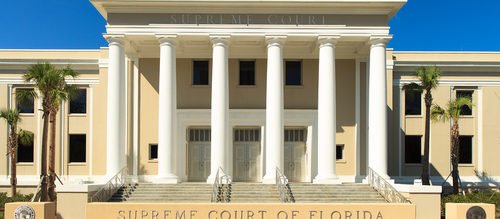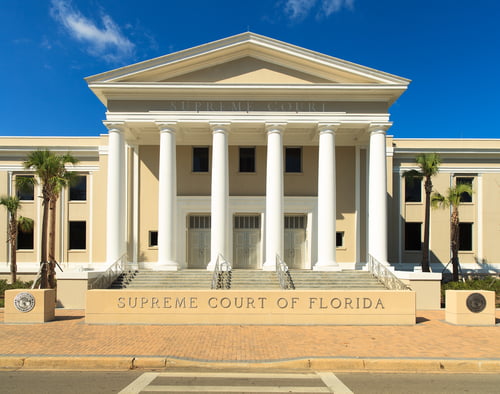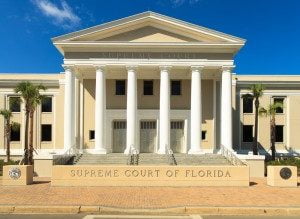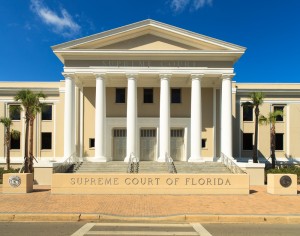Get to Know the Members of the Supreme Court of Florida


When representing each of its clients aggressively, the attorneys at Wagner, McLaughlin & Whittemore follow case law in Florida that has been interpreted and applied by the courts in the state. As the highest court in the state of Florida, the Florida Supreme Court is responsible for making final determinations as to what the state law is in Florida. You may never meet the justices in person – but their actions and interpretations of law affect many individuals who seek justice in the state court system.
The high court consists of seven justices, one of whom presides as the Chief Justice. Florida’s governor fills any vacancies on the high court by appointing an individual from a slate of names given to him by the Supreme Court judicial nominating commission. To be considered for the seat, one must be a Florida resident and registered voter and not older than 70 years of age. The term of a Justice lasts six years, after which each appointment must be confirmed by a retention vote of Florida’s voter during the general election.
The current Florida Supreme Court includes Justices Jorge Labarga, Charles Canady, Ricky Polston, C. Alan Lawson, Carlos G. Muñiz, John D. Couriel, and Jamie R. Grosshans.
Charles T. Canady is the current Chief Justice, serving for his third time in the position. Governor Crist appointed Charles Canady to the court in 2008. Born in Lakeland, Justice Canady was said to be one of the judges being considered by President Donald Trump as a successor to Justice Antonin Scalia on the United States Supreme Court. Justice Canady is a graduate of Haverford College and Yale Law School, where he earned his JD.
Former Governor Charlie Crist appointed Jorge Labarga to the court in 2009. Born in Havana, Cuba, Justice Labarga was retained in 2010 and 2016 and is credited with being the first Cuban-American to hold the post of Chief Justice in the state. Justice Labarga studied at the University of Florida and earned his J.D at the Levin College of Law in 1979. He has previously served as Chief Justice of Florida.
Ricky Polston was born in Alabama and raised in Graceville, Florida. Justice Polston was appointed by Governor Crist in 2008 and served as the Chief Justice from 2012 to 2014. Formerly a certified public accountant, Justice Polston was a judge on Florida’s First District Court of Appeal before joining the high court.
C. Alan Lawson was appointed to the court by Governor Rick Scott to replace the retiring Justice James E. C. Perry. He served as a judge of the Fifth District Court of Appeal before his appointment to the Supreme Court. Justice Lawson, born and raised in Lakeland, studied at Tallahassee Community College and Clemson University before earning his J.D. at the Florida State University College of Law.
Carlos G. Muñiz is one of the more recently appointed justices. Muñiz has served as a private and federal government attorney and in various positions in the Florida state government. After his studies at both the University of Virginia and Yale Law School, he clerked for multiple judges.
Last summer, John D. Couriel was appointed to the Florida Supreme Court. Previous to his appointment, Couriel served in a number of positions across the country, including as clerk for Honorable JohnD. Bates and as a Southern District of Florida Assistant United States Attorney.
Jamie R. Grosshans studied law at the University of Mississippi, where she clerked for multiple U.S. and state departments. She then went on to serve as an Assistant State Attorney in Orange County before entering private practice, serving as an Orange County Court Judge and on the Fifth District Court of Appeal.. Last September, Grosshans was appointed to the Florida Supreme Court.
Wagner, McLaughlin & Whittemore is a law firm based in the Tampa Bay area that specializes in personal injury cases. It is recognized as a “Best Law Firm” by Best Lawyers/U.S. News and World Report and handles cases involving personal injury, admiralty law, and medical and legal malpractice in Florida. One of the primary reasons for the success of the firm is its dedicated approach to serving the needs of each client.

Work with qualified Tampa civil justice lawyers!
 When someone is accused of a crime but cannot afford an attorney, the State is required to provide them with an attorney. This attorney then represents that person though all stages of their criminal case, while filing motions and negotiating on their behalf to ensure a just result.
When someone is accused of a crime but cannot afford an attorney, the State is required to provide them with an attorney. This attorney then represents that person though all stages of their criminal case, while filing motions and negotiating on their behalf to ensure a just result.
Criminal justice representation is acknowledged as a basic American right – but what about civil justice representation? While contingency fees allow most to have access to an experienced attorney for personal injury cases, other types of civil justice are neglected. Low- and moderate-income Americans get divorced just like high-income Americans do – and they would benefit just as much from the assistance of an experienced attorney to help them obtain a fair distribution of their assets. They need skilled advice to decide matters such as child custody and child support, to seek guardianships and protection orders. They need wills and contract assistance. They often need to understand tenant rights, eviction protections, and debt-relief options.
In Florida as in much of America, however, access to civil justice is mostly available only to those who can afford an attorney. Though there are legal aid options in some cases, they are necessarily limited to those with the most acute needs and the lowest of incomes.
To address these unmet needs, Florida has formed the Florida Commission on Access to Civil Justice, by administrative order of Florida Chief Justice Jorge Labarga. The Commission’s Interim Report, released on October 1, 2015, indicates that the members have identified some “concrete steps” to assist poor and middle-class Floridians in accessing legal help for life-changing problems. The initial recommendations call for such actions as a dedicated site to connect Floridians with existing legal-aid resources, enlisting law professors and retired judges to advise clients as pro-bono “emeritus attorneys,” and designating left- over class- action funds to help legal- aid expenses.
At Wagner, McLaughlin & Whittemore, we support and are excited by this movement toward the goal of providing quality legal representation for all Floridians. We applaud the Commission’s initial efforts and hope to see even more progress in the months and years to come.

 The Florida Legislature has provided a system whereby injured parties – from drivers struck by reckless police cars to wrongfully convicted prisoners – can sue the government in a circumstance where a private person would be liable , piercing the protections of sovereign immunity. But the process isn’t easy, and full compensation may be elusive. At the outset,, the sovereign immunity protections provide a damage cap to such liabilities, in the amount of $200,000 per person and $300,000 per incident. If your damages exceed that cap, you may be required to complete the complicated claim bill process in order to receive full compensation.
The Florida Legislature has provided a system whereby injured parties – from drivers struck by reckless police cars to wrongfully convicted prisoners – can sue the government in a circumstance where a private person would be liable , piercing the protections of sovereign immunity. But the process isn’t easy, and full compensation may be elusive. At the outset,, the sovereign immunity protections provide a damage cap to such liabilities, in the amount of $200,000 per person and $300,000 per incident. If your damages exceed that cap, you may be required to complete the complicated claim bill process in order to receive full compensation.
Claim Bills Cannot be Filed Unless a Party Exhausts Other Remedies First
The first step in each claim against the government is not much different from any other tort claim. You file suit, name the defendants, go through the discovery and negotiation process, and, if necessary, have the matter decided in a court of law. Depending on the governmental agency involved, there may also be an administrative process to navigate in order to reach a resolution.
When the court and administrative process works in your favor, you will end up with a judgment or negotiated agreement as to your damage amount. If that amount is below $200,000 per person and $300,000 per incident, the agent or entity should pay it and resolve the matter. If, however, the amount of your damages is found to be well above that number, you may choose to seek additional funds.
Insurance in Excess of the Cap is No Guarantee of Payment
The governmental officer or agency may have insurance coverage that exceeds the damage cap amount. If your damages are within the insurance coverage, the governmental entity may choose to settle your case out of the insurance policy. The decision to do so is, however, entirely within the discretion of the entity in question. If that agency or entity won’t release the funds, you will have to file a claim bill to attempt to receive full compensation.
Florida Claim Bill – Just a Bill
Part of the reason that you must exhaust all other remedies first is that a claim bill faces an uphill battle: You are asking, in essence, for the legislature to allocate funds out of the public coffers to cover your adjudicated damages. Though on its face that only seems fair, legislators may fear that they will gain few political benefits from giving money away, no matter how deserving the cause or case.
If you do decide to proceed, understand that a claim bill is filed with both the Florida Senate and the Florida House of Representatives, and must be passed by both legislative bodies. The bill must contain statements of the history of the case, the amount of the damages (previously decided by judgment or negotiated stipulation), and how much has already been paid by the officer or agency.
A claim bill must be filed within four years of the incident, and you should file before August 1 to increase the likelihood that your bill will be heard during the next regular session.
Once a claim bill is filed, a Special Master is appointed. The Special Master is charged to complete a separate discovery process, examine the evidence in the case through investigation and testimony, and decide what to recommend to the legislature in regards to the bill. The Special Master is not bound by jury verdicts or party stipulations, and may decide that a claim is worth less or even more than what was decided previously. Finally, the Special Master will prepare a formal recommendation that the bill be reported favorably or unfavorably and explain the facts and analysis that led to that recommendation.
The Special Master’s report is made available to members of the House and the Senate who must then vote on your claim bill, just like with any other piece of proposed legislation. Also like any other proposed piece of legislation, if your case is likely to be unpopular (as is almost any case seeking to allocate taxpayer funds away from the taxpayers at large), be prepared to face difficulty in obtaining a spot on the calendar for floor debate.
In the rare case that a claim bill is passed by the legislature, all parties must sign the settlement agreement before the case is considered resolved.
At Wagner, McLaughlin & Whittemore, we have experience in navigating through the often-frustrating Florida claim bill process, and we can help you understand how to proceed. If you have been injured by an officer or agency of the government, contact us today for a free consultation.

 Work with the Tampa law firm with over 40 years of experience!
Work with the Tampa law firm with over 40 years of experience!
For any given area of law, there are scores of lawyers vying for your business, and it can be extremely difficult to choose the best one. If you’re looking for a personal injury attorney in Tampa, Florida, for example, you might need several days of dedicated time to wade through the list of 100 attorneys offered by a single lawyer referral site.
So, how do you pick the lawyer who’s right for your case? Consider the following criteria:
Attorneys in Florida are not required to be board-certified in order to practice in their chosen area of law – and, in fact, board certification is only granted to approximately seven percent of all Florida attorneys. To become board certified, an attorney must demonstrate expertise in the certification area, pass a peer review and an examination, and take a battery of continuing legal education classes specific to that certification area. Then they must recertify every five years to maintain certification.
Board certification in the area of law most vital to your case is a strong indicator that you can rely on the strength of your attorney’s advice.
Do they have years of experience in that area of practice?
An attorney who started practicing in personal injury last week is unlikely to know as much as an attorney who has been practicing personal injury law for decades. Though all attorneys are trained to interpret the law, there is a world of difference between a seasoned PI attorney and a recent law school graduate. If you want someone to bake a magnificent wedding cake, you’re likely to hire an experienced pastry chef – not your cousin who likes to read dessert cookbooks but who has never actually entered a kitchen.
The more experience an attorney has, the less likely it is that he or she will make rookie mistakes on your case.
Are they leaders in the profession?
The most experienced attorneys are generally sought after by prestigious legal organizations such as the American College of Trial Lawyers, which consistently strives to improve the practice of civil and criminal trial law. ACTL is a by-invitation-only organization whose members are among the top 1% of the local attorney population in any given area. In making your choice among different lawyers, keep in mind that a member of ACTL is likely to be ethical, experienced, and respected by the courts.
Are they respected by their peers?
Within the legal profession, attorneys are regularly paid to argue with one another. We fight against our peers over and over again on factual questions, legal issues, and sometimes even moral grounds. It is especially telling, then, when an attorney has been nominated for an award by the members of his or her local bar association and has been recognized for excellence within the legal profession by those who are often opposed to his or her legal positions. Such a lawyer is often able to more effectively advocate for his or her clients because even other attorneys will be inclined to respect his or her arguments and case-related requests..
If an attorney has been given a peer-based award such as Best Lawyers or Super Lawyers, chances are they will be more able to leverage their legal expertise and reputation to help get you the settlement you deserve.
At Wagner, McLaughlin & Whittemore, we have been practicing personal injury law since 1967, and our firm’s partners are found on the rolls of board-certified attorneys, ACTL, Best Lawyers, and Super Lawyers, among many other legal honor organizations. If you have been injured in an accident or through the negligence of a doctor or lawyer, we would be pleased if your search for a lawyer led you to us. We would fight hard and tirelessly on your behalf. Contact us today for a free consultation.

 Few cases end up in the Florida Supreme Court, and most Floridians, it is safe to say, will never have the pleasure of meeting the men and women who sit as Florida Supreme Court justices. Still, the lives of the state’s citizens are affected every day, in ways large and small, by decisions rendered by the state’s highest court. The Justices serving on the Florida Supreme Court carry out the heavy calling of interpreting the Florida Constitution and ensuring that cases brought before them are decided fairly. The current court is made up of seven diverse individuals, each with an impressive background of service and excellence.
Few cases end up in the Florida Supreme Court, and most Floridians, it is safe to say, will never have the pleasure of meeting the men and women who sit as Florida Supreme Court justices. Still, the lives of the state’s citizens are affected every day, in ways large and small, by decisions rendered by the state’s highest court. The Justices serving on the Florida Supreme Court carry out the heavy calling of interpreting the Florida Constitution and ensuring that cases brought before them are decided fairly. The current court is made up of seven diverse individuals, each with an impressive background of service and excellence.
Chief Justice Jorge Labarga
On June 30, 2014, Chief Justice Labarga became the Florida Supreme Court’s first Hispanic Chief Justice. Born in Cuba, he came to Florida at the age of 11, eventually earning his law degree at the University of Florida. Before his appointment to the high bench, he worked as a public defender, a state prosecutor, and a private litigator handling personal injury and criminal defense cases. He’s been on the bench since 1996, first as a Circuit Court judge and then on the Fourth District Court of Appeals, before his 2009 appointment to the Florida Supreme Court.
Justice Barbara J. Pariente
Justice Pariente hails from New York but has been a Floridian for over forty years. After graduating fifth in her class from George Washington University Law School in 1973, she worked as a judicial clerk in the Southern District of Florida, and then practiced in West Palm Beach, specializing in civil trial litigation. She has a history of service within the bar and her local community and has been recognized nationally for excellence in legal practice. She was an appellate judge for four years before being appointed to the Florida Supreme Court in 1997, where she served as Chief Justice from 2004-2006. Justice Pariente has worked hard for the last decade to improve how the court system works with families and children.
Justice R. Fred Lewis
Like his colleagues, Justice Lewis is a decorated justice, having earned awards for excellence while routinely serving in leadership positions. He graduated third in his class from the University of Miami Law School in 1972 before completing the United States Army AG school at the top of his class. He finally entered private practice after his military discharge, working in civil trial and appellate litigation. He was appointed to the Florida Supreme Court in 1999 and has also served a term as Chief Justice. In 2002, the University of Central Florida created the Justice R. Fred Lewis Award, given annually to an individual demonstrating the highest level of social responsibility.
Justice Peggy A. Quince
Justice Quince’s stellar career has earned her numerous recognitions ranging from public service awards to lifetime achievement awards. She received her JD from the Catholic University of America in 1975 and has received two honorary doctor of laws degrees. She began her legal career in Washington, D.C. and Virginia, moving to Florida in 1978. For more than thirteen years, she worked as an assistant attorney general in the criminal division of the Florida Attorney General’s office, where she handled appeals and death penalty cases and worked five years as the Tampa Bureau Chief. In 1993, she became the first African-American woman to be appointed to a district court of appeal, and was thereafter appointed to the Florida Supreme Court in 1998, the first African-American woman to hold that honorable seat.
Justice Charles T. Canady
Justice Canady received his law degree from Yale Law School in 1979 before entering private practice in Florida. From 1984 through 2001, Justice Canady served three terms in the Florida House of Representatives and four terms in the United States House of Representatives. While in Washington, Justice Canady was a member of the House Judiciary Committee and served three terms as Chairman of the House Judiciary Subcommittee on the Constitution. After leaving Congress, he served as General Counsel to Governor Jeb Bush before being appointed to the Second District Court of Appeal in 2002. He was appointed to the Florida Supreme Court in 2008 and served as Chief Justice from July 2010 through June 2012.
Justice Ricky Polston
From Graceville, Florida, Justice Polston started his professional life as a CPA, after earning his license in 1978. He graduated from Florida State University College of Law with high honors in 1986 and entered private law practice in 1987. He was appointed to the First District Court of Appeal in 2001 and has served as an Adjunct Law Professor at Florida State University since 2003. Justice Polston was appointed to the Florida State Supreme Court in 2008. Like the other Justices, Justice Polston can boast several awards, both from school and from his excellence in law practice. He is the father of ten, including six adopted siblings.
Justice James E.C. Perry
Justice Perry earned his law degree from Columbia Law School in 1972, after serving as a first lieutenant in the U.S. Army. While his work in private practice specializing in civil and business law is remarkable, much of his time has also been dedicated to improving the lives of children in his community. He founded the Jackie Robinson Sports Association, a baseball league serving hundreds of at-risk children. In 2000, he became the first African-American appointed to the Eighteenth Judicial Circuit, serving as Circuit Chief Judge from 2003-2005. He was appointed to the Florida Supreme Court in 2009.
As citizens and attorneys, we at Wagner, McLaughlin & Whittemore respect these wise jurists and support them as they navigate the difficulties of such important positions.
If you are in need of legal counsel in the Tampa, Florida area, contact us today for a free consultation.

